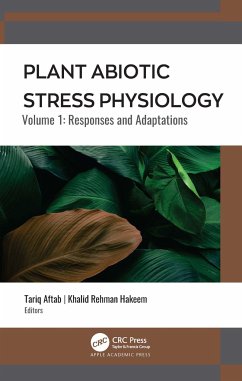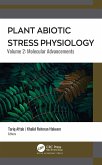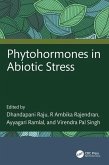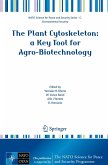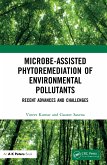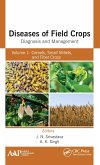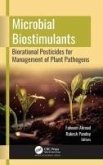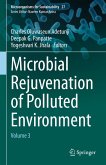Plant Abiotic Stress Physiology
Volume 1: Responses and Adaptations
Herausgeber: Hakeem, Khalid Rehman; Aftab, Tariq
Plant Abiotic Stress Physiology
Volume 1: Responses and Adaptations
Herausgeber: Hakeem, Khalid Rehman; Aftab, Tariq
- Gebundenes Buch
- Merkliste
- Auf die Merkliste
- Bewerten Bewerten
- Teilen
- Produkt teilen
- Produkterinnerung
- Produkterinnerung
Focuses on the responses and adaptations of plants to stress factors at the cellular and molecular levels. It covers redox homeostasis managers, oxidative damage and antioxidative defense mechanism, photosynthesis and respiration under challenging environments, salinity-induced changes, genetics approaches for improving abiotic stress tolerance, CR
Andere Kunden interessierten sich auch für
![Plant Abiotic Stress Physiology Plant Abiotic Stress Physiology]() Plant Abiotic Stress Physiology188,99 €
Plant Abiotic Stress Physiology188,99 €![Phytohormones in Abiotic Stress Phytohormones in Abiotic Stress]() Phytohormones in Abiotic Stress165,99 €
Phytohormones in Abiotic Stress165,99 €![The Plant Cytoskeleton: A Key Tool for Agro-Biotechnology The Plant Cytoskeleton: A Key Tool for Agro-Biotechnology]() The Plant Cytoskeleton: A Key Tool for Agro-Biotechnology149,99 €
The Plant Cytoskeleton: A Key Tool for Agro-Biotechnology149,99 €![Microbe-Assisted Phytoremediation of Environmental Pollutants Microbe-Assisted Phytoremediation of Environmental Pollutants]() Vineet KumarMicrobe-Assisted Phytoremediation of Environmental Pollutants153,99 €
Vineet KumarMicrobe-Assisted Phytoremediation of Environmental Pollutants153,99 €![Diseases of Field Crops Diagnosis and Management Diseases of Field Crops Diagnosis and Management]() Diseases of Field Crops Diagnosis and Management186,99 €
Diseases of Field Crops Diagnosis and Management186,99 €![Microbial Biostimulants Microbial Biostimulants]() Microbial Biostimulants242,99 €
Microbial Biostimulants242,99 €![Microbial Rejuvenation of Polluted Environment Microbial Rejuvenation of Polluted Environment]() Microbial Rejuvenation of Polluted Environment177,99 €
Microbial Rejuvenation of Polluted Environment177,99 €-
-
-
Focuses on the responses and adaptations of plants to stress factors at the cellular and molecular levels. It covers redox homeostasis managers, oxidative damage and antioxidative defense mechanism, photosynthesis and respiration under challenging environments, salinity-induced changes, genetics approaches for improving abiotic stress tolerance, CR
Hinweis: Dieser Artikel kann nur an eine deutsche Lieferadresse ausgeliefert werden.
Hinweis: Dieser Artikel kann nur an eine deutsche Lieferadresse ausgeliefert werden.
Produktdetails
- Produktdetails
- Verlag: Apple Academic Press
- Seitenzahl: 406
- Erscheinungstermin: 17. Februar 2022
- Englisch
- Abmessung: 234mm x 156mm x 24mm
- Gewicht: 771g
- ISBN-13: 9781774630174
- ISBN-10: 1774630176
- Artikelnr.: 62799980
- Herstellerkennzeichnung
- Libri GmbH
- Europaallee 1
- 36244 Bad Hersfeld
- gpsr@libri.de
- Verlag: Apple Academic Press
- Seitenzahl: 406
- Erscheinungstermin: 17. Februar 2022
- Englisch
- Abmessung: 234mm x 156mm x 24mm
- Gewicht: 771g
- ISBN-13: 9781774630174
- ISBN-10: 1774630176
- Artikelnr.: 62799980
- Herstellerkennzeichnung
- Libri GmbH
- Europaallee 1
- 36244 Bad Hersfeld
- gpsr@libri.de
Tariq Aftab, PhD, is currently an Assistant Professor in the Department of Botany at Aligarh Muslim University, India, where he earned his PhD. He is the recipient of a prestigious Leibniz-DAAD fellowship from Germany, a Raman Fellowship from the Government of India, and a Young Scientist Awards from the State Government of Uttar Pradesh (India) and Government of India. After completing his doctorate, he worked as Research Fellow at the National Bureau of Plant Genetic Resources, New Delhi, and as Postdoctorate Fellow at Jamia Hamdard, New Delhi, India. Dr. Aftab was also a Visiting Scientist at the Leibniz Institute of Plant Genetics and Crop Plant Research (IPK), Gatersleben, Germany, and in the Department of Plant Biology, Michigan State University, USA. He is a member of various scientific associations from India and abroad. He has edited seven books with with international publishers, including Elsevier Inc., Springer Nature and CRC Press (Taylor & Francis Group); co-authored several book chapters, and has published over 60 research papers in peer-reviewed international journals. His research interests include physiological, proteomic, and molecular studies on medicinal and aromatic plants. Khalid Rehman Hakeem, PhD, is Professor at King Abdulaziz University, Jeddah, Saudi Arabia. After completing his doctorate (botany; specialization in plant eco-physiology and molecular biology) from Jamia Hamdard, New Delhi, India, he worked as a lecturer at the University of Kashmir, Srinagar, India, at Universiti Putra Malaysia, Selangor, Malaysia, he was a Postdoctorate Fellow and Fellow Researcher (Associate Professor) for several years. Dr. Hakeem has more than 10 years of teaching and research experience in plant eco-physiology, biotechnology and molecular biology, medicinal plant research, plant-microbe-soil interactions, as well as in environmental studies. He is the recipient of several fellowships at both national and international levels. He has served as a visiting scientist at Jinan University, Guangzhou, China. Currently, he is involved with a number of international research projects with different government organizations. To date, Dr. Hakeem has authored and edited more than 60 books with international publishers. He also has to his credit more than 115 research publications in peer-reviewed international journals and 55 book chapters in edited volumes with international publishers. At present, Dr. Hakeem serves as an editorial board member and reviewer for several high-impact international scientific journals. He is included in the advisory board of Cambridge Scholars Publishing, UK. He is also a fellow of the Plantae group of the American Society of Plant Biologists, member of the World Academy of Sciences, member of the International Society for Development and Sustainability, Japan, and member of the Asian Federation of Biotechnology, Korea.
1. Innovations in Crop Production: An Amalgamation of Abiotic Stress
Physiology and Technology 2. Redox Homeostasis Managers in Plants under
Environmental Stresses 3. Reactive Oxygen and Nitrogen Species: Oxidative
Damage and Antioxidative Defense Mechanism in Plants under Abiotic Stress
4. Physiological Mechanisms of Plants Involved in Phosphorus Nutrition and
Their Deficiency Management 5. Responses and Adaptation of Photosynthesis
and Respiration under Challenging Environments 6. Forward and Reverse
Genetics Approaches for Improving Abiotic Stress Tolerance in Crop Plants
7. Salinity-Induced Changes on Different Physiological and Biochemical
Features of Plants 8. Next-Generation Climate Resilient Agricultural
Technology in Traditional Farming for Food and Nutritional Safety in the
Modern Era of Climate Change 9. CRISPR/CAS-Mediated Genome Editing
Technologies in Plants 10. Use of Ornamental Plants for the
Phytoremediation of Metal Contaminated Soils 11. Role of Electromagnetic
Radiations in Abiotic Stress Tolerance
Physiology and Technology 2. Redox Homeostasis Managers in Plants under
Environmental Stresses 3. Reactive Oxygen and Nitrogen Species: Oxidative
Damage and Antioxidative Defense Mechanism in Plants under Abiotic Stress
4. Physiological Mechanisms of Plants Involved in Phosphorus Nutrition and
Their Deficiency Management 5. Responses and Adaptation of Photosynthesis
and Respiration under Challenging Environments 6. Forward and Reverse
Genetics Approaches for Improving Abiotic Stress Tolerance in Crop Plants
7. Salinity-Induced Changes on Different Physiological and Biochemical
Features of Plants 8. Next-Generation Climate Resilient Agricultural
Technology in Traditional Farming for Food and Nutritional Safety in the
Modern Era of Climate Change 9. CRISPR/CAS-Mediated Genome Editing
Technologies in Plants 10. Use of Ornamental Plants for the
Phytoremediation of Metal Contaminated Soils 11. Role of Electromagnetic
Radiations in Abiotic Stress Tolerance
1. Innovations in Crop Production: An Amalgamation of Abiotic Stress
Physiology and Technology 2. Redox Homeostasis Managers in Plants under
Environmental Stresses 3. Reactive Oxygen and Nitrogen Species: Oxidative
Damage and Antioxidative Defense Mechanism in Plants under Abiotic Stress
4. Physiological Mechanisms of Plants Involved in Phosphorus Nutrition and
Their Deficiency Management 5. Responses and Adaptation of Photosynthesis
and Respiration under Challenging Environments 6. Forward and Reverse
Genetics Approaches for Improving Abiotic Stress Tolerance in Crop Plants
7. Salinity-Induced Changes on Different Physiological and Biochemical
Features of Plants 8. Next-Generation Climate Resilient Agricultural
Technology in Traditional Farming for Food and Nutritional Safety in the
Modern Era of Climate Change 9. CRISPR/CAS-Mediated Genome Editing
Technologies in Plants 10. Use of Ornamental Plants for the
Phytoremediation of Metal Contaminated Soils 11. Role of Electromagnetic
Radiations in Abiotic Stress Tolerance
Physiology and Technology 2. Redox Homeostasis Managers in Plants under
Environmental Stresses 3. Reactive Oxygen and Nitrogen Species: Oxidative
Damage and Antioxidative Defense Mechanism in Plants under Abiotic Stress
4. Physiological Mechanisms of Plants Involved in Phosphorus Nutrition and
Their Deficiency Management 5. Responses and Adaptation of Photosynthesis
and Respiration under Challenging Environments 6. Forward and Reverse
Genetics Approaches for Improving Abiotic Stress Tolerance in Crop Plants
7. Salinity-Induced Changes on Different Physiological and Biochemical
Features of Plants 8. Next-Generation Climate Resilient Agricultural
Technology in Traditional Farming for Food and Nutritional Safety in the
Modern Era of Climate Change 9. CRISPR/CAS-Mediated Genome Editing
Technologies in Plants 10. Use of Ornamental Plants for the
Phytoremediation of Metal Contaminated Soils 11. Role of Electromagnetic
Radiations in Abiotic Stress Tolerance

